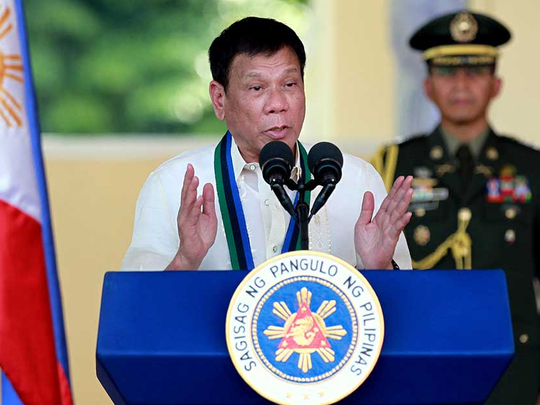
Manila: Philippines President Rodrigo Duterte is not an autocrat and is taking seriously a report by the US intelligence community that names the firebrand leader among the threats to democracy in south-east Asia, his spokesman said on Wednesday.
He was reacting to US Intelligence Community in its Worldwide Threat Assessment (WTA) released by Daniel Coats, US director of national intelligence, on February 13.
Myopic, speculative
Duterte’s spokesman Harry Roque said it is “myopic and speculative at best,” hinting it could tatter ties between the US and the Philippines, which have been military allies for 67 years.
• Philippine police to reactivate controversial anti-drugs drive
• Duterte worried by Catholic Church’s offer
• Philippine police chief speaks on ‘troubled’ officers
Citing reasons for its anti-Duterte view, WTA mentioned his war on illegal drug trade which has killed almost 4,000 since mid-2016; plans to impose a nationwide martial law; suspend the Constitution; declare a “revolutionary government;” and extensive use of social media against critics.
Propaganda, misinformation
Based on the findings of Freedom House, WTA also said, “We note that more governments are using propaganda and misinformation in social media to influence foreign and domestic audiences.”
It also slammed Thai officials and Cambodia’s Prime Minister Hun Sen as south-east Asian leaders who threaten democracy and human rights.
'Unfriendly declaration'
“With declarations such as this, it is very difficult to be friendly with the United States... It doesn’t seem to be too friendly a declaration. This is something we are taking very seriously.
"It is coming from the intelligence community. It is not even coming from the State Department. It is something that the president will take seriously as well,” said Roque on Wednesday.
Democracy and human rights in many south-east Asian nations will remain fragile in 2018 because of autocratic tendencies, rampant corruption and cronyism, the US intelligence community said in its Worldwide Threat Assessment report of February 13.
Threat of Martial Law
“Duterte has suggested he could suspend the constitution, declare a ‘revolutionary government’, and impose nationwide martial law,” it said.
Roque dismissed that assessment.
“For one, President Rodrigo Roa Duterte is no autocrat or has autocratic tendencies. He adheres to the rule of law and remains loyal to the constitution,” Roque said in a statement.
There is no revolutionary government or nationwide martial law, which US intelligence officials say Duterte might impose, he added.
Duterte has publicly made such threats on several occasions, however.
Philippine lawmakers in December approved a year-long extension of martial rule in the volatile southern region of Mindanao to suppress threats such as communist insurgents and Islamist militants.
“Our media are still able to broadcast and print what they want — ‘fake news’ included. Our judiciary and the courts are functioning as usual. Our legislature remains independent and basic services are still being delivered,” said Roque.
Tapping social media
Citing pro-government social media, Roque said, “I don’t know of any government in the free world which does not use the internet and social media to promote its agenda. This is very true especially in the case of the US. This latest intelligence assessment is a classic case in point.”
“It is foolhardy not to tap social media as a tool when the technology exists for free,” said Roque, adding that political opposition and non-government organisations use social media to elevate their causes.
This is not the first time the United States has shown concern about Duterte, who is notorious for his defiance of international pressure. Duterte was infuriated by expressions of concern by former President Barack Obama’s administration about drug-war killings in the Philippines.
Duterte praised by Trump
Obama’s successor, Donald Trump, praised Duterte for doing an “unbelievable job on the drug problem,” but refrained from expressing concern about the crackdown during a visit to the Philippine capital last November.
More than 4,000 people have been killed in what police call legitimate operations against suspected drug dealers and users in Duterte’s signature war on drugs since July 2016.
Rights groups accused police of summary executions, which authorities deny. International Criminal Court prosecutors have opened a preliminary examination into Duterte’s anti-drugs campaign.
— with inputs from Reuters











